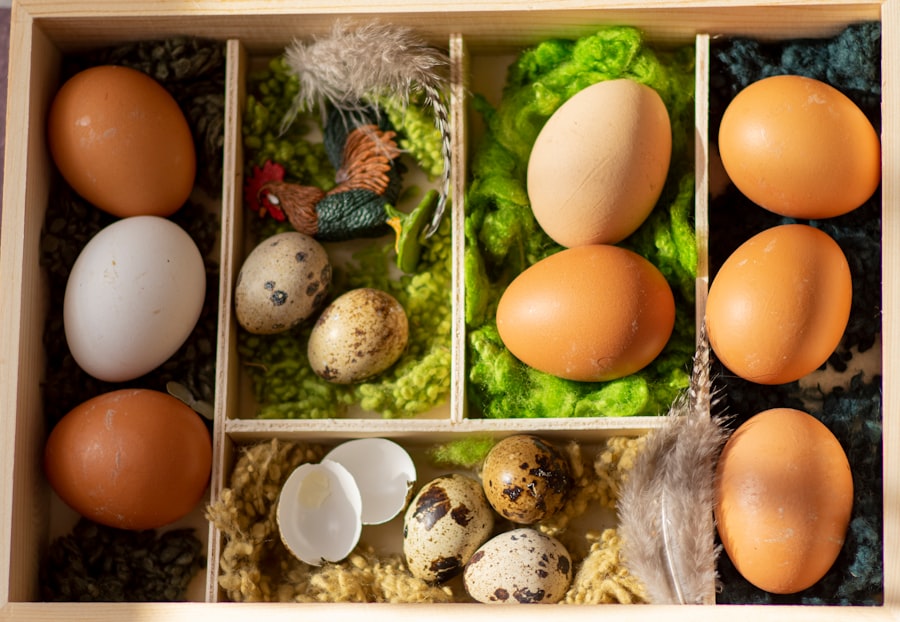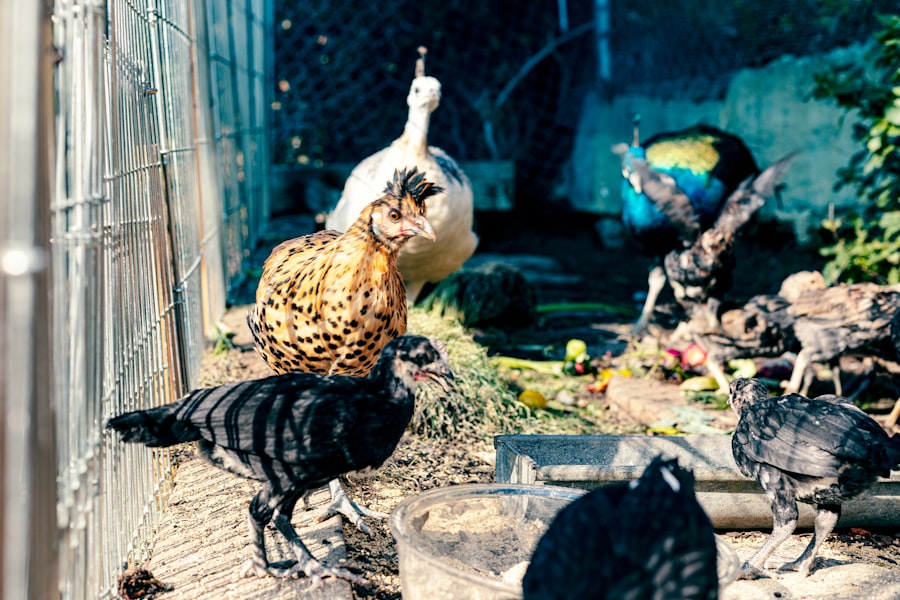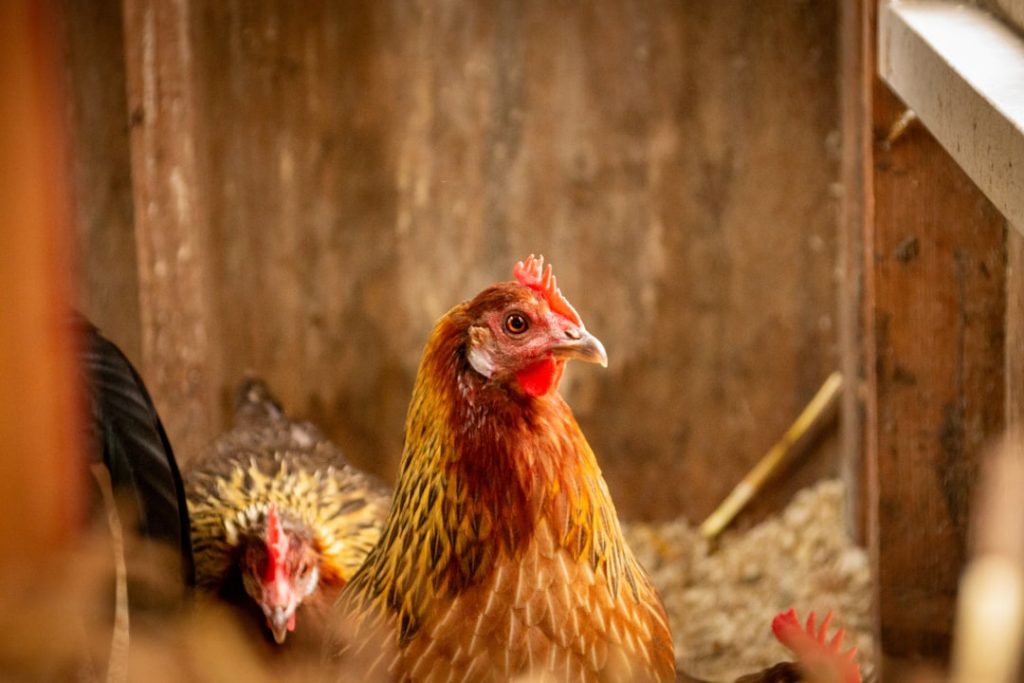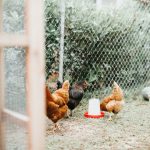Protecting chickens from predators requires understanding the common threats they face. Typical predators include foxes, raccoons, coyotes, weasels, hawks, owls, and domestic dogs. Each predator has distinct behaviors and methods of attack.
Foxes are known for their cunning nature and ability to dig under fences. Raccoons are adept climbers, capable of accessing coops through open windows or doors. Hawks and owls are aerial predators that can swiftly capture chickens from above.
Domestic dogs, even those typically well-behaved, may exhibit a strong prey drive towards chickens. It is crucial to inform neighbors and visitors about the importance of keeping their dogs leashed and away from the flock. By comprehending the behavior and habits of these various predators, chicken owners can implement effective protective measures.
This knowledge allows for the development of proactive strategies to secure coops and safeguard flocks from potential harm. Understanding these threats is essential for maintaining the safety and well-being of chickens in both rural and urban environments.
Table of Contents
Key Takeaways
- Common predators of chickens include foxes, raccoons, hawks, and snakes
- Secure the coop by using heavy-duty locks, hardware cloth, and predator-proof materials
- Implement deterrents such as motion-activated lights, noise makers, and predator scent repellents
- Provide adequate lighting around the coop to deter nocturnal predators
- Utilize fencing and netting to create a physical barrier against predators
- Implement a predator-proof run with a secure roof and buried wire mesh to prevent digging
- Utilize guard animals such as dogs or geese to protect the flock from predators
Securing the Coop
Inspecting the Coop’s Structure
Check for any gaps or holes in the walls or roof that could allow predators to gain access to the coop. Make sure that all doors and windows are securely latched and cannot be easily opened by predators. Consider installing locks or latches that require human dexterity to open, as this can help prevent clever predators like raccoons from gaining entry.
Protecting the Coop from Digging Predators
Predators like foxes and weasels are skilled diggers and can easily tunnel under a coop to gain access to your chickens. To prevent this, consider burying hardware cloth or wire mesh around the perimeter of the coop to deter digging predators. This should extend at least 12 inches below ground to prevent predators from tunneling underneath.
Creating a Safe Environment
By securing the coop with sturdy materials and addressing any potential weak spots, you can create a safe and secure environment for your chickens.
Implementing Predatory Deterrents

In addition to securing the coop, implementing predatory deterrents can help keep predators at bay. One effective deterrent is motion-activated lighting or sound devices. These can startle predators and deter them from approaching the coop.
Additionally, consider using predator scent deterrents such as coyote or fox urine around the perimeter of the coop. This can create the illusion that a larger predator is in the area, causing smaller predators to steer clear. Another effective deterrent is the use of predator-resistant feeders and waterers.
These are designed to prevent access by larger predators like raccoons and opossums, which can easily raid a coop for food and water. By implementing these deterrents, you can create an environment that is less attractive to predators and reduce the risk of an attack on your flock.
Providing Adequate Lighting
Adequate lighting around the coop can also help deter nocturnal predators like raccoons and foxes. Consider installing motion-activated lights around the perimeter of the coop to startle predators and make them think twice about approaching. Additionally, consider keeping a light on inside the coop during the night to create a deterrent for nocturnal predators.
This added visibility can make it more difficult for predators to approach undetected, reducing the risk of an attack on your flock. In addition to external lighting, consider providing adequate lighting inside the coop as well. This can help reduce stress in your chickens and make it easier for them to see potential threats.
By providing adequate lighting both inside and outside the coop, you can create a safer environment for your flock and reduce the risk of a predator attack.
Utilizing Fencing and Netting
Fencing and netting are essential components of predator-proofing your chicken coop. When it comes to fencing, it’s important to use sturdy materials such as hardware cloth or welded wire mesh with small openings to prevent predators from gaining access. Make sure that the fencing extends at least 6 feet high and is buried at least 12 inches below ground to prevent digging predators from gaining entry.
In addition to fencing, consider using netting over the top of the chicken run to prevent aerial predators like hawks and owls from swooping down and snatching your chickens. This netting should be securely fastened and extend over the entire run to provide maximum protection. By utilizing fencing and netting, you can create a secure outdoor space for your chickens that is less vulnerable to predator attacks.
Implementing a Predator-Proof Run

Securing the Run
In addition to securing the coop, it’s essential to create a predator-proof run for your chickens to safely roam during the day. This run should be enclosed with sturdy fencing and netting to prevent access by ground-based and aerial predators.
Preventing Predator Access
Consider using hardware cloth or welded wire mesh with small openings to prevent digging predators from gaining access. Make sure that the fencing extends at least 6 feet high to prevent jumping or climbing predators from gaining entry.
Providing Cover and Shelter
It’s also important to provide adequate cover within the run to give your chickens a place to hide if they sense danger. Consider planting shrubs or providing shelters within the run where your chickens can seek refuge if a predator approaches.
By implementing a predator-proof run, you can provide your chickens with a safe outdoor space where they can roam without fear of attack.
Utilizing Guard Animals
One effective way to protect your chickens from predators is by utilizing guard animals such as dogs or geese. Livestock guardian dogs are bred specifically for protecting livestock from predators and can be highly effective at deterring threats. These dogs are trained to patrol the perimeter of the property and ward off potential predators, providing an added layer of protection for your flock.
Geese are also effective guard animals due to their loud honking and aggressive nature towards potential threats. They are known for their territorial behavior and will often alert you to the presence of a predator with their loud calls. By utilizing guard animals, you can provide an additional level of security for your chickens and reduce the risk of predator attacks.
In conclusion, protecting your chickens from predators requires a multi-faceted approach that includes securing the coop, implementing deterrents, providing adequate lighting, utilizing fencing and netting, creating a predator-proof run, and utilizing guard animals. By understanding common predators and taking proactive measures to protect your flock, you can create a safe and secure environment for your chickens to thrive. With careful planning and attention to detail, you can minimize the risk of predator attacks and provide your chickens with the protection they need to live happy and healthy lives.
If you’re looking for tips on how to keep your chickens safe, you may also be interested in learning about the best kind of coop for chickens. Check out this article for helpful information on creating a secure and comfortable living space for your feathered friends.
FAQs
What are the common predators of chickens?
Common predators of chickens include foxes, raccoons, hawks, owls, snakes, and domestic dogs.
How can I protect my chickens from predators?
You can protect your chickens from predators by using secure fencing, locking them in a predator-proof coop at night, and using motion-activated lights or sound devices to deter predators.
What are some signs that my chickens are in danger from predators?
Signs that your chickens are in danger from predators include missing or injured chickens, disturbed bedding or nesting areas, and evidence of digging or scratching around the coop.
Are there any natural deterrents for predators?
Some natural deterrents for predators include keeping guard animals such as dogs or geese, using strong-smelling herbs or plants around the coop, and keeping the area well-lit at night.
What should I do if I suspect a predator is targeting my chickens?
If you suspect a predator is targeting your chickens, you should immediately secure the coop and investigate the area for signs of the predator. You may also consider setting up traps or contacting a professional wildlife removal service.
Meet Walter, the feathered-friend fanatic of Florida! Nestled in the sunshine state, Walter struts through life with his feathered companions, clucking his way to happiness. With a coop that’s fancier than a five-star hotel, he’s the Don Juan of the chicken world. When he’s not teaching his hens to do the cha-cha, you’ll find him in a heated debate with his prized rooster, Sir Clucks-a-Lot. Walter’s poultry passion is no yolk; he’s the sunny-side-up guy you never knew you needed in your flock of friends!







